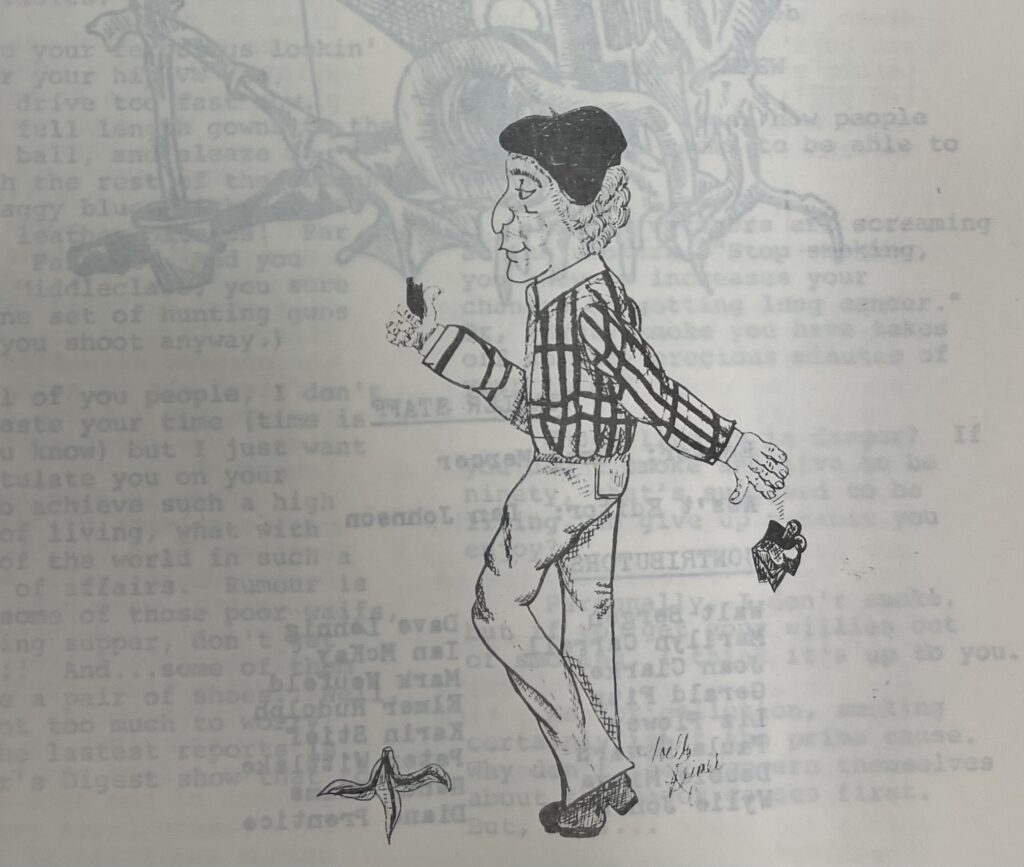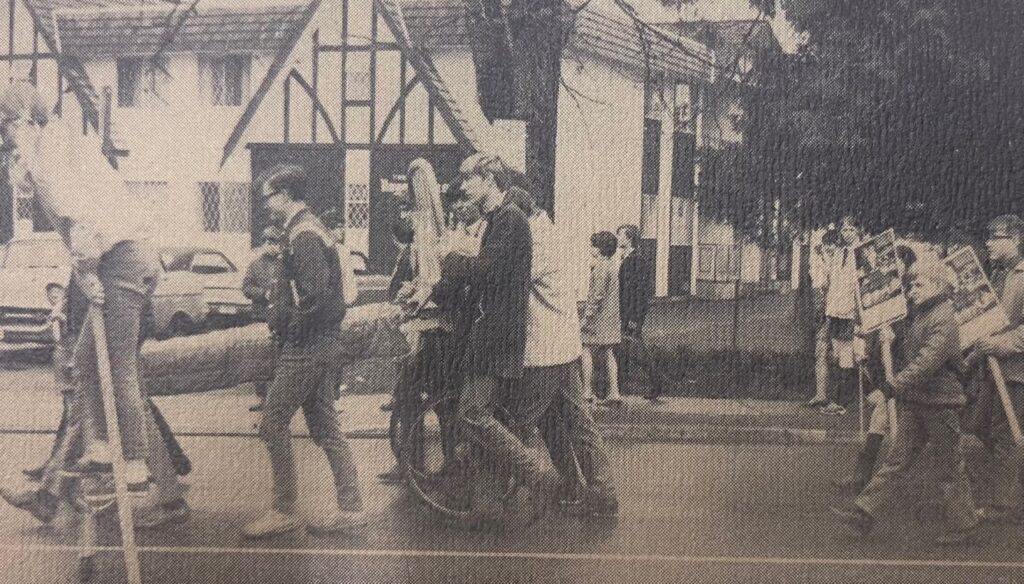In the late 1960s and early 1970s, CSSS students engaged in protests and political debates over a number of issues. Their perspectives differ among each other, but even more so, they differ from the generations before. The students have an inclination to protest not seen before in Chilliwack’s generations, and this was frowned on by the older generations. Protests are not simply done over local issues, but even broader international issues, with students even going south of the border to protest. The students were engaged in the important political issues of the day, especially the capital punishment and legalization of marijuana debate. All of this shows a change in perspective from the previous generations, but also a generation that is ready to reject the political values and views of the older generations and create their own worldviews.

One major protest was concerning the Amchitka blast where students would cross the American border to protest Nixon, whose nickname was Dick, and his bomb experiments. Amchitka was an American island close to Alaska where Nixon administration was experimenting with and exploding nuclear weapons and one experiment in 1971 that sparked the protests was a blast 250 times the size of Hiroshima that had horrific environmental consequences.[1] The students protested in various ways and many went to join demonstrations across the border.[2] There was also a poem written in the school newspaper that expressed a desire to see Nixon dead. There were other opinions on the Amchitka; one student said, “I hate it! And if President Nixon had any feelings, he wouldn’t do it.”[3] Another student said, “It’s ridiculous! A waste of time, money and environment.” Also, one student wrote, “I’m beginning to think pollution won’t kill us. Mr. Nixon seems to have a better plan.”[4] So, the students had strong opinions on the Nixon administration, especially because of Amchitka.
The reason that one student wrote that Nixon may have a better plan to kill them than pollution was because there were increasing environmental concerns among students. One student advocated for a complete revision of the legal system because it was not addressing modern concerns including around the environment. He wrote, “Perhaps the most effective way of dealing with environmental deterioration in society today is simply the modification and full use of our present legal system… If a government wishes a plus action, a reward is more effective than the threat of punishment.”[5] So the student went on to suggest that when it comes to concerns around pollution and over-population, it would be better to reward those who work to fight these issues, instead of punishing those who do not.[6] While the student did handle this matter with a bit of humour, suggesting that the way it would work is to reward those who do not have children instead of imprisoning those who have many children, it is clear that the student body was concerned about the environment.
Because of the growing environmental concerns, the student government decided to deal with the issue of littering on campus. They decided to start a “filth list,” which was a list that would name the names of each student caught littering that week.[7] The student council would take down the name of each student they saw litter without telling them, and this list would be shared weekly over the P.A. system and in the Tatler, the student newspaper.[8] The goal was to solve the littering problem on campus, and if the filth list did not work, the student council threatened that they would ban smoking from the quad, where it was legal.[9] The goal of the filth list was to “embarrass” anyone seen littering.[10] They did, in fact, carry this out. The first filth list contained the names of eight students; however, overtime the filth list decreased and disappeared as it seemed to work and there was less of a littering problem.
There was also a major debate on capital punishment in the student body. When polled, 83 percent expressed support for capital punishment for first-degree murderers.[11] While some students expressed opposition to capital punishment, only 5 percent were because they feared an innocent person would be killed, but 46% of those opposed were simply against the taking of a human life.[12] The majority opinion was that without capital punishment, there would be more offenders. Capital punishment was believed to be an effective deterrent. This political opinion is one example of how Chilliwack was still a more conservative place, even among the students.
One unique perspective on capital punishment was that instead of killing those convicted of serious crime, they should be maimed. Joe Ogmundson, a student, explained his theory: “It’s hard to see the problem. Any citizen of any country should be shot upon any wrongdoing. But not shot to death, simply maimed. A maimed person can hardly do any more wrong.”[13] Now, it is possible Joe is attempting to use humour to argue against capital punishment, and this is very possible; however, he explains his case further. He wrote, “Imagine a convicted thief with his knee cap shot up. He’ll never pull a job again, he could not run away.”[14] So, this is one example of either the use of humour to make a point, or a unique proposed solution to the problem of capital punishment at the time.

Although through all this, besides the issue of capital punishment, the students of CSSS appear less conservative, this was not entirely the case. One student, Ken Klem, accused Prime Minister Pierre Trudeau of being a communist: “Trudeau’s a communist. He admits he was involved with the communists before he became Prime Minister. He keeps going over to China and Russia signing treaties, getting us involved with them deeper and deeper.”[15] Ken Klem also expressed that his fellow students who went to protest Nixon did not know much about anything and that it was all a “farce.”[16] However, Ken did express that he held certain political opinions because he liked to “egg people on.”[17] So, this shows more of a reactionary, conservative political worldview which is something that there likely would be more of in Chilliwack.
Overall, there was a sense of disillusionment with politics among the teens of CSSS. A student wrote, “Our generation has been scared by the disappointment of defeat. Lack of action by the government has bred in some Canadians a sense of futility. Why try so hard if all the effort comes out disappointingly?”[18] So, many teenagers were disillusioned with politics and were simply not engaged as voters when they turned eighteen. However, some students encouraged those turning 18 to be informed and prepared to vote: “When the vote is multiplied by millions of new voters whose concern is equal to yours, why not be prepared to accept the responsibility of making choices on complex issues, and of supporting elected officials? For now you are a part of the establishment- and it needs new voices.”[19] So, there were those teenagers who were disillusioned, and there were those who cared and were eager to participate in Canadian democracy.
So, while student protests demonstrate generational change in the activities and political opinions of students, the opinions on capital punishment show Chilliwack remains a more conservative place, even among students. There is a spectrum of political opinions, and there are students who are disillusioned with politics and there are those engaged. Many were would be considered disillusioned were still engaged in their own way, they simply thought the system was broken. The generations before in Chilliwack would likely have never engaged in protest, and so this is one example of changing attitudes and perspectives in the baby boomers in Chilliwack in the late 1960s and early 1970s.
[1] “Amchitka Island,” Nuclear Princeton, Princeton University. https://nuclearprinceton.princeton.edu/amchitka-island. Accessed April 9, 2023.
[2] Carol H., “Sumas Border Incident,” Tatler, Chilliwack Senior Secondary School, October 8, 1971, 5.
[3] “Public Opinion Poll” Tatler, Chilliwack Senior Secondary School, November 5, 1970, 7.
[4] K.S., Student Quote on Nixon, Tatler, Chilliwack Senior Secondary School, May 12, 1972, 6. .38
[5] Rufus, “Our Legal System,” Tatler, March 3, 1972, 4. .21
[6] Rufus, “Our Legal System,” Tatler, March 3, 1972, 4. .21
[7] “Filth List Starts Next Week,” Tatler, Chilliwack Senior Secondary School, October 15, 1971, 5.
[8] “Filth List Starts Next Week,” Tatler, Chilliwack Senior Secondary School, October 15, 1971, 5.
[9] “Filth List,” Tatler, Chilliwack Senior Secondary School, December 3, 1971, 5.
[10] “Filth List,” Tatler, Chilliwack Senior Secondary School, December 3, 1971, 5.
[11] “Capital Punishment- Should it Be Revived?” Tatler, Chilliwack Secondary School, November 19, 1971, 5, .17
[12] “Capital Punishment- Should it be Revived?” Tatler, Chilliwack Senior Secondary School, November 19, 1971, 5. .17
[13] Joe Ogmundson, “On Question of Capital Punishment,” Tatler, Chilliwack Senior Secondary, n.d. .44, 3.
[14] Joe Ogmundson, “On Question of Capital Punishment,” Tatler, Chilliwack Senior Secondary, n.d. .44, 3.
[15] Ken Klem, “The Interview that Backfired” Tatler, Chilliwack Senior Secondary School, December 10, 1971, 3.
[16] Ken Klem, “The Interview that Backfired” Tatler, Chilliwack Senior Secondary School, December 10, 1971, 3.
[17] Ken Klem, “The Interview that Backfired” Tatler, Chilliwack Senior Secondary School, December 10, 1971, 3.
[18] “The Vote’s our Chance to put our Money Where our Mouth is!” Tatler, Chilliwack Senior Secondary School, n.d. .22, 3.
[19] “The Vote’s our Chance to put our Money Where our Mouth is!” Tatler, Chilliwack Senior Secondary School, n.d. .22, 3.
